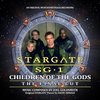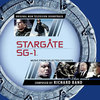Track Listing
| 1. | Stargate SG-1: Main Title | 1:02 |
| 2. | Suite From "The Enemy Within" | 6:46 |
| 3. | Suite From "Cold Lazarus" | 6:09 |
| 4. | Suite From "Emancipation" | 3:35 |
| 5. | Suite From "Torment Of Tantalus" | 10:14 |
| 6. | Suite From "Thor's Hammer" | 7:32 |
| 7. | Suite From "The Nox" | 10:01 |
| 8. | Suite From "Hathor" | 6:44 |
| 9. | Suite From "Tin Man" | 6:56 |
| 10. | Suite From "Within The Serpent's Grasp" | 8:42 |
| 11. | Stargate SG-1: End Credits | 0:58 |
| Total Album Time: | 68:39 |
Related Albums

Stargate SG-1: Children of the Gods - The Final CutLimited Edition of 1,000 Units
Dragon's Domain RecordsReleased: March 26, 2018
Format: CD (73 min)

Stargate SG-1: Music from Selected EpisodesIntrada (Special Collection Vol. 374)
Released: June 27, 2017
Format: CD (106 min)

Up And Down: Richard Band - Film And Television MusicSuper Tracks Music (RBCD-01/02)
Released: 1999
Format: CD
Review: Best of Stargate SG-1, The
3 / 5 Stars
I have to admit: I am a huge fan of David Arnold's score to Stargate. I don't know quite why, but the combination of swashbuckling, epic orchestral music just struck a chord with me. So imagine my concern when I heard that they were going to make a television show based on the film. Who would write the music? Would they use Arnold's themes? How would it sound if it were all synthesized? Fortunately, my fears were put to rest when the show actually came out. I admit, however, that I was not an avid watcher. But I had seen a few episodes, and was pleasantly surprised. Not only were the stories fresh and interesting, but the music was quite enjoyable as well. The primary composer on the series was Joel Goldsmith, with occasional episodes scored by Dennis McCarthy, Kevin Kiner, and Richard Band. On the new album "The Best of Stargate SG-1", suites from nine episodes of the show are presented, and adequately provide the listener with a sampling of the quality work on the series.
Beginning with an arrangement of Arnold's themes, "Stargate SG-1: Main Title" was arranged by Joel Goldsmith, and has all the energy and excitement you would expect for an adventure series. "The Enemy Within" is a suite running almost seven minutes long with music by both Dennis McCarthy and Kevin Kiner. The music is tense and dramatic - and contains only hints of Arnold's themes. Richard Band's suite from "Cold Lazarus" is a very soft, subtle one, more romantically edged and calm than the previous action suite. I particularly enjoyed his piano rendition of Arnold's main theme, but found his original thematic material to be just as enjoyable.
Kevin Kiner gets two of his own suites in "Emancipation" and "Torment Of Tantalus". The first one is another tense action cue, and given Kiner's work on Wing Commander (again with themes by David Arnold), it comes as no surprise that he nails the "David Arnold style", allowing this cue to fit quite snugly in the Stargate universe. The very long suite from "Torment Of Tantalus" is probably the best cue on the album. Starting off slinky and jazzy, the suite stays in the dramatic realm for a while before encountering an incredibly powerful, hard-hitting moment. Then it's back to the drama for a while, before rounding out with an action-laden climax. It's ten-minutes of great television music.
Finally, we come to the other half of the album, containing five suites of music by Joel Goldsmith, the primary composer on the show. "Thor's Hammer" is a rather enjoyable bit of music that uses Arnold's themes sparingly, but just enough to remind you it's a Stargate world. "The Nox" is light and almost playful for the first half, and when the action cue finally kicks in, it's almost six-minutes into the suite. The music is exciting, but didn't feel as powerful as the previous action cues in the first half of the album. The next three suites vary from the exotic and mysterious ("Hathor"), to the dark and military ("Tin Man", "Within The Serpent's Grasp").
Capping off the album is Joel Goldsmith's original "End Credits" cue. It's not anything from Stargate, but it certainly fits in that universe. Which brings up one of my complaints of the album. The first half was very grounded stylistically (as well as thematically) in David Arnold's Stargate universe. It felt like it was part of it, even if it didn't always use Arnold's themes. The second half of the album, while it used the themes liberally, didn't feel stylistically the same. In fact, I would venture so far as to suggest that Joel Goldsmith's work sounded like something cut from his father's cloth, rather than David Arnold's. That isn't to say that it's bad - on the contrary, it's quite good. It just feels a bit odd when compared to the other cues. Aditionally, I honestly have to say that the synth samples Goldsmith used (aside from the "Main Titles" and "End Credits", the entire album is synth) weren't as good as the McCarthy/Kiner/Band cues. Still, this album will satisfy any fan of the television series, as well as any Stargate fan.
-
Click stars
to rate.
If any information appears to be missing from this page, contact us and let us know!


